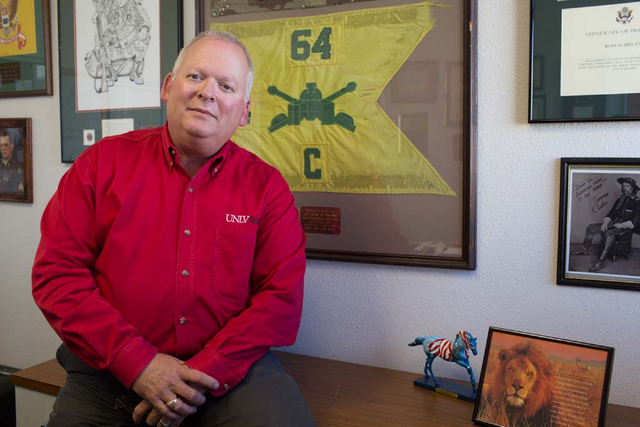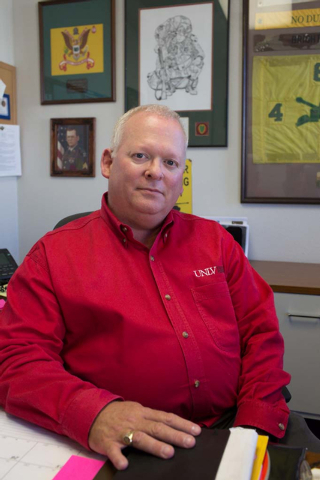Nevada colleges welcome out-of-state veterans with tuition break



Out-of-state veterans with their sights set on higher education have an incentive to call Nevada home.
Under a law that took effect July 1, non-resident veterans are allowed to pay in-state tuition at any Nevada System of Higher Education institution. The law grants Nevada residency to veterans who enroll in school within two years of being honorably discharged from service.
“It was very important, ” said Ross Bryant, director of UNLV’s Office of Veteran Services, of the tuition break. “This makes it a truly welcome home.”
Twenty states, including Nevada, have laws providing in-state residency waivers to student veterans, eight others have a school or school systems that offers the same waiver while nine other states have pending legislation, according to Student Veterans of America. Information on the organization’s website is one of the ways states get the word out to potential veteran students about the perk Nevada offers them.
This fall, 180 out-of-state veterans are paying in-state tuition and fee rates at the University of Nevada, Las Vegas.
Maj. Charles A. Carte, a United States Marine Corps Reserve member, is one of those taking advantage of the in-state rate at UNLV. He is getting a graduate certificate in new venture management, which he plans to use to start a business.
Going to school in Nevada at a lower cost has been a big help to him, he said earlier this week.
“It’s thousands of dollars in savings,” said the 41-year-old, who is originally from Virginia. “Plus, I plan on making Las Vegas my home.”
The change had been discussed for years, Bryant said. Out-of-state veterans always have been interested in pursuing higher education in Nevada, but they didn’t because they had to pay a higher rate.
“That’s a huge challenge for a veteran,” he said. “That’s why you see the spike” now.
Undergraduate tuition and fees for Nevada residents taking 15 credits per semester at UNLV in 2013-14 is $6,570 annually. For non-residents taking 15 credits a semester, the annual tuition cost is $20,480, said Afsha Bawany, UNLV spokeswoman.
UNLV also has gradually been making changes to attract and better serve veteran students. This fall, the Veterans Administration assigned a staff member to UNLV to help students who receive VA benefits. It also reopened an advising office at Nellis Air Force Base, which was closed five years ago because of budget cuts.
The university once offered courses through part-time instructors at Nellis, but those efforts also were halted by budget pressures, said Rainier Spencer, associate vice provost for academic affairs at UNLV.
UNLV revived some of those efforts this fall. It has an academic adviser at the base once a week and it hopes to begin to offer undergraduate courses in the summer or fall of 2014, said Afsha Bawany, a UNLV spokeswoman.
Officials hope to have a more robust program this time and they hope to use full-time instructors as well, Spencer said.
There’s about a million veterans attending school nationwide and another million veterans are expected in the next three years, Bryant said.
“We have everything set up to help them,” he said.
So far this fall, an estimated 1,267 active-duty military personnel, reservists, National Guard members, veterans and their dependents are attending UNLV. Of that number, 916 are receiving tuition benefits through some version of the G.I. Bill, Bryant said. About 700 of them are receiving benefits from the Post 9/11 G.I. Bill, specifically, he added.
A total of 276 new veterans started at UNLV this semester and 180 of them are from out-of-state, he said.
“It’s one of the best things that they’ve done,” said Jeff Detrick, a veteran and student at UNLV and president of the school’s Student Veterans Organization. ” There’s a number of veterans that otherwise couldn’t have come to UNLV.”
In fall 2012, an estimated 1,100 active duty, reservists, National Guard members, veterans and their dependents attended UNLV, Bryant said.
Assemblyman Elliot Anderson, D-Las Vegas, said the change in law will make a “huge difference.”
One of the challenges that Nevada faces is the lack of enough skilled workforce, he said. People in the military receive a lot of training from which they gain various skills.
In addition, by attracting veterans to Nevada, the state is getting “folks who are good citizens, dedicated and hard-working people,” he said. The new law will help the state “compete for that workforce.”
“I definitely had the background to understand why it would make a difference to help us diversify the economy and keep attracting a skilled workforce into our state,” said Anderson, who is a veteran himself and was one of the sponsors for the legislation.
He added that veterans often want to relocate.
“One of the things that people are looking forward to when they get out of the military is for a place that’s exciting,” Anderson said. “We have a lot to offer.”
Nevada State College so far has 99 student veterans enrolled and four of them are from out-of-state. Last fall, it had a total of 112 student veterans and five of them were from out-of-state, according to Mandi Enger, spokeswoman for the college.
The College of Southern Nevada so far this fall has 1,453 student veterans enrolled, compared to 1,405 last fall. A total of 29 post-9/11 G.I. Bill student veterans are taking advantage of the in-state tuition and fee rate under the new law, according to K.C. Brekken, CSN spokeswoman.
To see a map showing states that offer in-state residency waiver to student veterans, please visit www.studentveterans.org
Reporter Yesenia Amaro can be reached at (702) 383-0440, or yamaro@reviewjournal.com. Follow on Twitter at @YeseniaAmaro.












